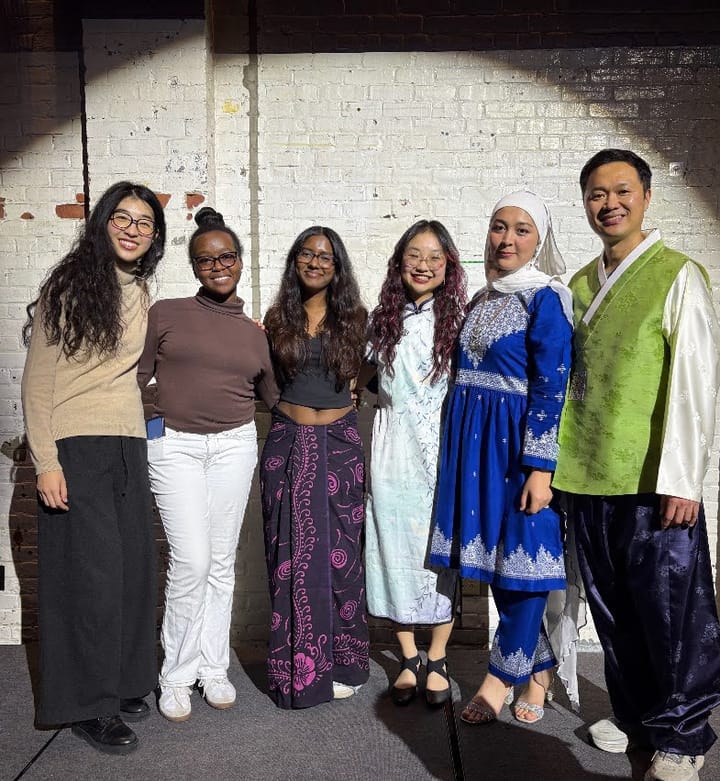WAMH × The Student: Reflecting on Joni Mitchell's "Blue"
Joni Mitchell's birthday on Nov. 7 provides a perfect chance to look back on the varied, introspective, and moving music she created. WAMH host Olive Amdur '23 reflects on "Blue," one of her favorite albums, finding both newness and memories in each of its songs.


Brought to you by the WAMH blog, where it can also be found, and The Student's Arts and Living Section. This piece was written by WAMH Music Blog Director Olive Amdur '23.
“Ladies of the Canon,” the show I host on WAMH on Sundays at 8, is named for Joni Mitchell’s 1970 album “Ladies of the Canyon.” I spend the hour playing music by women in indie, alternative rock, and folk music, sometimes interspersed with songs that have nothing to do with the theme that I just want to play loudly on the studio speakers.
Save for the few seconds of the album opener of “Ladies of the Canyon” that I play at the beginning of each show, I don’t wind up playing very much Joni. This past Sunday though, I realized in the studio it was Nov. 7 — Joni Mitchell’s 78th birthday.
When I sat down to begin this piece, I told myself I wouldn’t write about Joni Mitchell, and especially that I wouldn’t write about her 1971 album “Blue.” I told myself I’d branch out and do an album review of something new, because everyone had read enough about “Blue” on its 50th anniversary this June. I said that if I were to write about Joni, it would be about “Ladies of the Canyon” or “Hejira,” or maybe her later music. Then, out of the blue, sitting in a patch of sun on one of the strangely warm days we’ve had recently, I got a text from my mom: the link to a video of Brandi Carlisle covering the song “Blue.” I listened to it. Then I listened to all of the album “Blue” again, and now I can’t think about much else.
“I am on a lonely road, and I am traveling,” are the bare lyrics that open the album. “I want to knit you a sweater, want to write you a love letter,” she admits later in that first song, “All I Want.” “Blue” is an album known for its honesty. Joni sings about love and loss, about moving away from the homes and people she knows and growing closer to new ones, about the daughter she gave up for adoption, about her disenchantments at the end of the ’60s and the wider-spread aches of her generation.
In the second song on the album, “My Old Man,” Joni sings about a realization, away in Europe after announcing her retirement from performance, that she no longer wanted to marry Graham Nash (of Crosby, Stills, and Nash renown).
In the third track, “Little Green,” she dreams of a life for her estranged daughter. She sings, “there’ll be icicles and birthday clothes and sometimes there'll be sorrow.” This is one of my favorite songs on the album: brutal, honest, and capable of capturing the unique deepening of joy and sadness in growing up.
Then comes “Carey,” and then “Blue,” which I think is the most serene and solemn track on the album, absent of the dynamic guitar patterns I so identify with Joni. She talks about the Vietnam War and that same European trip in “California,” which is a song about both leaving and coming home. “This Flight Tonight” and “River” also carry this sense of motion, and “A Case of You” reminds us that at the heart of home are her people and the love she holds for them.
“I get my gorgeous wings and fly away, only a phase, these dark cafe days,” are the lines that end “Blue.” In an album so focused on home and the many ways it shifts, this moment of freedom is Joni’s step into herself as the first, last, and ultimate home. “Will you take me as I am?” she asks earlier. By the end, she has found herself in the ability to pose the question.
I first really listened to this album during the September of my first year at Amherst, on a slow and solitary afternoon just before the leaves turned. Everything around me was — and felt — new, and I missed Brooklyn: home. Walking wide loops on the paths around campus because I didn’t yet know where the bike trail was, I turned on “Blue” because it was an album I knew my mother listened to when she was my age, and because I missed my mother. I found myself wholly transported.
The lines that stuck out to me then were the ones about loneliness: “Oh, it gets so lonely when you're walking, and the streets are full of strangers”; “I am a lonely painter, I live in a box of paints”; and in a different way, “I wish I had a river I could skate away on.” I hadn’t yet been able to admit how far from home I felt in those days, and I found comfort in listening to Joni do so.
This June was the 50th anniversary of “Blue,” and I listened to the album over and over again all summer. This time, walking on the bike trail or sitting in an Adirondack chair, I finally felt settled and at home: in the valley, in Amherst, away from Brooklyn, in myself. Listening to this album then, different things struck me than my first time listening, like the depth of Joni’s expressions of love, the simple sweetness of morning sun and crocuses, and the way she reaches for an embrace of life as motion between lightness and sorrow.
The first memory I have of Joni’s music is from a summer camp bonfire. I am eight or nine and singing Joni’s “The Circle Game” with my cabin and counselors. Someone is playing a guitar, and I am crying softly because I don’t want the summer to end and because the lyrics “cartwheels turn to car wheels through the town” remind me overwhelmingly that I am growing up. I have been doing a lot of thinking recently about growing up, growing down, and growing in general. Joni’s music is a music of homes, growths and changes — making home in changes. It is music I keep with me for that reason. Like she sings in the song “Blue,” “songs are like tattoos.”
That last Sunday in the studio, I realized it was her birthday after coming across a birthday post for her on Twitter. There was a photo of Joni: smiling in a red coat and black hat, her hair in a long braid over one shoulder — beautiful. And I filled my queue with her songs to celebrate her, sit with her and find again, like I always do, newness in her songs: new ways of growing, homing, allowing myself to change. So, happy belated 78th Joni, and thanks.





Comments ()